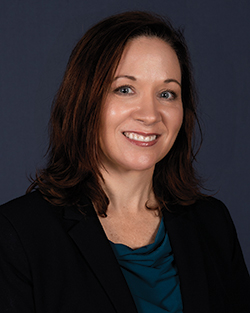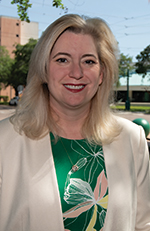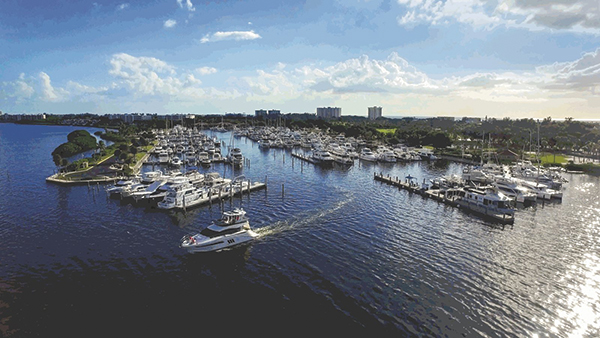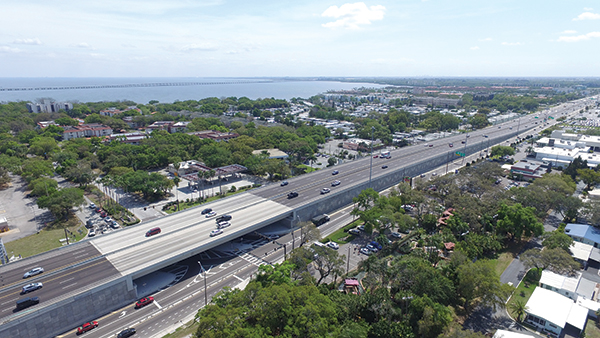Sometimes even a popular place needs a makeover. Clearwater, one of the most visited beach destinations in America, is getting one right now.
While far from a complete overhaul, this transformation is one of both image and substance. The substance is the rezoning and repositioning of a major corridor along U.S. Highway 19. The image makeover and outreach campaign are being funded in part by a Duke Energy Economic Development Grant.
The primary goal of this makeover is to position the city’s primary north-south thoroughfare as a destination for employment, growth and investment. It’s an ambitious undertaking as the plan covers seven miles along U.S. 19 and would take approximately 30 years to build out.
The city is ready to tackle the challenge.

“When we increased the development height limit to 150 feet, it generated a ton of interest.”
– Denise Sanderson, Economic Development & Housing Director, City of Clearwater
“We have a vision for this area of the city as a place for employment-intensive uses in industries, such as software, finance and insurance, emerging technologies, corporate headquarters and others well-suited for the region’s skilled and talented labor force,” said Denise Sanderson, economic development and housing director for the City of Clearwater.
A Place to Live and Work
Countryside Mall and a spring training ballpark for the Philadelphia Phillies are two major landmarks on this stretch of highway. Sanderson envisions a day, though, when people will do more than just drive there to shop and play. The city wants them to live and work there.
“The Countryside Mall area is still very under-utilized,” she says. “Developers get it. When we increased the development height limit to 150 feet, it generated a ton of interest. Our entire MSA [Tampa-St. Petersburg-Clearwater] is well-suited for office-intensive uses. We envision interconnected parcels supported by transit. Once we get one or two good companies to locate there, the market will take hold. That’s why we are launching this campaign now.”
For years, Clearwater has battled an image problem associated with the Church of Scientology, an organization that has spent $103 million since 2016 to buy up property in the city, according to the Tampa Bay Times. A 101-acre area in central Clearwater is controlled almost entirely by the church and its members, who have gobbled up more than 90 parcels and properties there since January 2017. More than 50 of these properties are downtown.
Sanderson says it’s time for the city to be known for something else. “Major employment centers are in downtown Clearwater, but that area struggles because of the Church of Scientology and their land grabs over the last several years,” she notes. “As a city, we are in tremendous financial shape. Our MSA has the second largest manufacturing base in Florida, and there are 27 institutions of higher learning within an hour’s drive. There is no better time than now to engage the City of Clearwater.”
USF On a Mission to Support Business
One of those higher-ed institutions is the University of South Florida St. Petersburg. Regional Chancellor Christian Hardigree says a primary mission of her campus is to support the needs of the business community in Pinellas County, from St. Petersburg to Tarpon Springs.

“We are very blended with the community.”
– Christian Hardigree, Regional Chancellor, University of South Florida St. Petersburg
“We received a $17 million donation last year to expand our fintech program,” she says. “We have researchers and scientists here who are advancing the blue economy. We have other renowned programs, including graphic arts, digital communications and multimedia journalism. We are very blended with the community.”
Sanderson says assets like USF St. Pete are part of the draw to Pinellas: “Our proximity to Port Tampa Bay and two international airports, the fact that we have the No. 1 beach in the country, and that we are centrally located to a lot of great assets in the region are just a few of the reasons why companies like doing business in Clearwater.”
8 Florida Cities Primed to Land HQ Deals
Eight of the top 30 U.S. cities for headquarters operations in the post-pandemic business environment are in Florida, according to a study released recently by The Boyd Company Inc.
The national site selection consulting firm based in Princeton, New Jersey, considered remote working trends, state tax structures, operating costs, growing fiscal and quality of life challenges in established headquarters hubs, and other factors in compiling the list of what it says are the most competitive locations for corporate headquarters in the new economy.
Boyd conducted a detailed cost analysis that covers all major geographically variable cost factors that are critical to the corporate site selection process including labor, real estate, construction, utilities, taxes and travel.
The eight Florida cities that made the list were Aventura, Boca Raton, Lake Mary, Naples, Palm Bay, Ponte Vedra, Sarasota and Sunrise. Texas was next on the list with five cities, followed by Tennessee with four and Nevada with three.
“As companies reduce their total office square footage, exchange private desks for collaboration areas and add amenities aimed at encouraging workers out of their homes and back into their offices, they are increasingly changing the look of the post-pandemic office and where it should be located,” said John Boyd Jr., principal of the firm. “This rethinking of the physical office is being carried out under a strategic cost-containment mode given the economic challenges of 2023 and the talk of a potential recession. Most companies have already embraced some form of the hybrid office and are concluding that it makes no sense to pay for office space filled with empty desks and few workers.”
Boyd established these criteria as drivers behind the most attractive locations:
- States with superior income tax climates for companies.
- States with superior personal income tax climates for C-suite executives and their staff.
- Locations with attractive lifestyle amenities.
- Locations with favorable operating cost structures.
- Locations with strong travel and hospitality support services for periodic corporate-wide staff meetings, team-building sessions, employee training and client-serving functions.
- Locations showing positive in-migration demographics and business attraction trends.
- Locations with attractive housing markets for C-suite executives.
The cost model used by Boyd assumes the construction of a new Class A, 75,000-sq.-ft., corporate head office employing 200 administrative support workers. Based upon that model, the most expensive location on the list was Everett, Washington, with total annual operating costs of $21.13 million. The cheapest place was East Brainerd, Tennessee, at $17.79 million.
Among the Florida cities to make the list, Aventura near Miami came in as the most expensive spot with a total annual operating bill of $19.73 million. Ponte Vedra near Jacksonville was the least costly Florida market at $18.45 million.

Sarasota ranks as one of the 30 best locations in the U.S. for headquarters operations, according to The Boyd Company Inc.
Courtesy of Sarasota EDC
“Companies are increasingly changing the look of the post-pandemic office and where it should be located.”
— John Boyd Jr., Principal, The Boyd Company Inc.
How 8 Florida Cities Ranked by Cost Among Top 30 U.S. Cities for HQs
Aventura – 10th most expensive
Sunrise – 12th
Boca Raton – 14th
Naples – 18th
Palm Bay – 21st
Lake Mary – 23rd
Sarasota – 24th
Ponte Vedra – 25th
Source: The Boyd Company Inc.
The Top 30 U.S. Cities for HQs (alphabetical by state)
Oro Valley, AZ
Scottsdale, AZ
Aventura, FL
Boca Raton, FL
Lake Mary, FL
Naples, FL
Palm Bay, FL
Ponte Vedra, FL
Sarasota, FL
Sunrise, FL
Minden, NV
Henderson, NV
Summerlin, NV
Portsmouth, NH
Nashua, NH
Concord, NC
Durham, NC
Blue Ash, OH
Dublin, OH
East Brainerd, TN
Germantown, TN
Mt. Juliet, TN
Oak Ridge, TN
Frisco, TX
Pflugerville, TX
Sugar Land, TX
Westlake, TX
Woodlands, TX
Everett, WA
Kirkland, WA
Source: The Boyd Company Inc.

